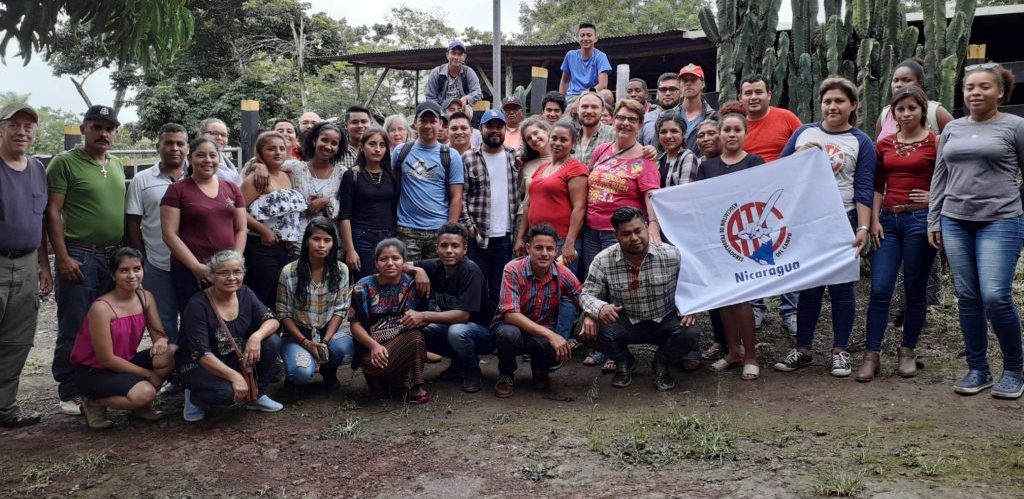
Above photo: From July 11–21, 2019, the Friends of the ATC and the ATC hosted their “Solidarity with Nicaragua” delegation. Friends of the ATC.
“The Land is Our Mother”
When a group of campesinas in the community of Santa Julia, Nicaragua founded the Gloria Quintanilla Cooperative in 2008 with the Rural Workers’ Association (Asociación de Trabajadores del Campo – ATC), one of their basic rules was that men were not allowed to hurt women. With much struggle, they have rid their rural community of machismo and established a high value on women’s work. In collaboration with the ATC and the Sandinista government, the women have fought for and won land titles in their names, their own homes, access to education, improved roads, and most recently, a community water well.
In this new publication, “The Land is Our Mother,” the women of the Gloria Quintanilla Cooperative explain that they consume what is native to the land so their children and grandchildren can be healthy. They use agroecology to ensure that the land, their second mother, stays strong. They prioritize education and involvement of youth in their organization so that the next generation carries out the Gloria Quintanilla Cooperative’s vision for advancement in Santa Julia and Nicaragua.
These testimonies were collected as part of a project of the Friends of the ATC’s July 2019 “Solidarity with Nicaragua” delegation. You can read all published testimonies here.
Excerpt from “The Land is Our Mother”:
Lola
My name is Lola del Carmen Esquivel Gonzales. I am from Nicaragua and represent the women of the countryside.
At the very young age of 11 years (during the Somoza dictatorship), I worked in the fields, the campesino life. I didn’t have land; I was an agricultural worker. It was hard because there was no education, no protection for children. There were no rights for women. There was no healthcare. My mother and I were nomads, moving through various departments looking for work, harvesting cane sugar. We didn’t have a home. I became a woman: I learned to walk with a machete, cut coffee and cotton and cane, sell fruit, and clean rooms in Corinto, Chinandega.
In 1979, at the age of 14, I met the Rural Workers Association (ATC) and I woke up. I never thought I would learn to defend my rights, to defend the rights of others. The main thing was to be in solidarity, to see ourselves not for our color but for the heart we have to serve.
Ten years later, I learned to write my first letters, to train myself, I learned what a forum is, what it was like to speak in public (a process that made me sweat and tremble). Then it allowed me to do concrete things like form a union and go to the Ministry of Labor with a worker. This also allowed me to stand up at the mayor’s office, to fight for the right to water, the right to have roads. The ATC guided me on what my rights are and how to apply them by organizing.
In 1983, we came up with the idea of forming a union under the name of Imelda Gonzales, a woman heroine of the same calibre as myself who has since died. We had the idea of forming a cooperative in 2008.
All these years, from 1979 to 2019, have been a very rich accumulation of experience that has allowed me to defend my rights with all my might. If I see a woman being abused, I get involved and defend her. If I see the government being bad-mouthed, I get involved and defend it. I was a woman who never went to school, yet today I have traveled to other countries to speak out and talk about all of the good things that we have in this country from the perspective of the peasantry.
The main achievement of the Revolution is property. It’s important that everyone has their piece of land. The second point is the struggle for water. The third point is organization: if we were not organized, we would not be able to achieve all that we have here. The fourth point is education because a country without knowledge is not prepared to struggle. Even though I didn’t go to a school and neither did Eloísa, we are happy that Lea, Claudia, and all the young people are studying, because the community continues developing.
The other point is food production because we cannot live without food. Today the land is diversified. There is no one who doesn’t have avocados, bananas, or yucca. The change is gigantic. Twenty years ago we had to borrow rice because there was no food. Now we have food in the community. It is very important because if there is education and there is food, there are people who want to move forward.
Read Lola’s full testimony and access all seven testimonies of the publication here.
 RSS Feed
RSS Feed















 November 3rd, 2020
November 3rd, 2020  Awake Goy
Awake Goy  Posted in
Posted in  Tags:
Tags: 













